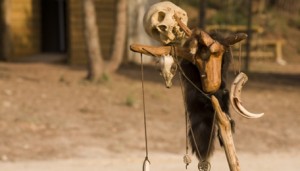Ritual Murders in Nyasaland November 26, 2015
Author: Beach Combing | in : Contemporary , trackbackThe following was a written answer given in a written exchange in the British parliament 13 March 1962. At this date Nyasaland (aka Malawi) was a British territory and would be for another two years. (In the postwar period the British government was often put under pressure over the question of responsibility for colonial possessions and for individual administrative and judicial act.) It is interesting in that it shows a report of two witchcraft murders in the territory and a subsequent vegetable poison ordeal (!!).
Details of cases of so-called ritual murder during past twelve months [in Nyasaland]. (a) Case of murder committed in Port Herald District on 27th March, 1961. Six persons accused a woman called Nsai of bewitching the daughter of one of them by creating a crocodile which had subsequently eaten the child. They took Nsai from her house, stripped her, lashed her to stakes and burnt her alive. Before Nsai died, she named a second woman in the village, Khanachaka, as being responsible for the death of the child. The six men went to the house of Khanachaka, took her to where the charred body of Nsai was lying and burnt her in similar fashion. Four of the six were sentenced to death at Blantyre on 21st December, 1961, and the remaining two, who were juveniles were released. (b) Case of trial by ordeal in the Port Herald District reported on 9th January, 1962. In this case, which is still under investigation, the allegation is that the deceased woman, who was suspected of witchcraft, was forced to undergo a trial by ordeal which included the administration of a liquid alleged to be a vegetable poison. A total of thirteen persons have been arrested in connection with this case.
Colonial records would be a fascinating source for African witchcraft history, though perhaps records were only adequately kept in European capitals from after the First World War. Of course, such witch hunts and witch shenanigans continue to be reported from contemporary Africa. In some Sub-Saharan African states there is considerable latitude given to ‘traditional’ methods; in a handful traditional magic is credited with the success of the anti-colonial movements. But these kind of colonial records are perhaps more dispassionate and more detailed as anthropological sources. Memory of the Leopard Men Society and the Baboon Men Society (other posts other days).
Any other good sources for African ritual murder: drbeachcombing AT yahoo DOT com



